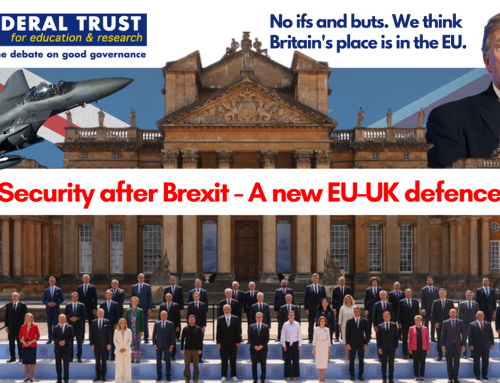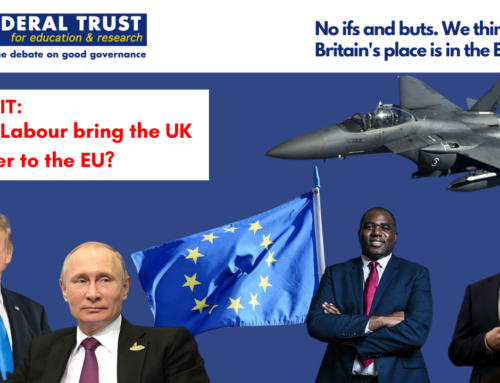
by Bob Savic
Visiting Professor at the Asia Research Institute, Nottingham University; Senior Research Fellow at the Global Policy Institute;
2nd June 2020
The Chinese government’s announcement of a controversial new national security law for Hong Kong has encountered distinctively restrained responses from policymakers and officials in Brussels and other European Union (EU) capitals in contrast to combative countermeasures coming out of Washington DC and London.
As a result of US President Donald Trump’s numerous threats of withdrawals and actual exits from various global institutions, opening cracks in policy differences over international relations, between the EU and US, are at risk of turning into gaping holes. Recently, this has arguably taken shape in the form of each side’s varying reactions to China’s National Security law for Hong Kong. Alongside the concurrent US withdrawal from the World Health Organisation (WHO), there is mounting evidence that the EU’s patience with US unilateralism is nearing an end, as the European body shifts its focus of international cooperation and official messaging in favour of China’s pledges and steps towards multilateralism.
EU and US responses to China’s draft National Security Law for Hong Kong
On the day Beijing announced the new security law for Hong Kong, at its closely-watched annual gathering of lawmakers and advisors at the National Peoples’ Congress, there was widespread bipartisan outrage and condemnation in the US. The day after China’s surprise announcement, Trump promised to “revoke Hong Kong’s preferential treatment as a separate customs and travel territory”. Without detailing any measures, there are concerns that such revocation could spell the end of Hong Kong as a global financial centre and its current status as Asia’s premier business hub.
The UK’s foreign secretary, Dominic Raab, also warned China that if it were to follow through with the new law, the UK will give certain Hong Kong residents, who hold British National Overseas (BNO) passports, the right to work and study in the UK on 12-month extendible stays with the incentive of it becoming a potential route to full UK citizenship. Currently, around 300,000 Hong Kong BNO passport holders are entitled to limited six-month stays in the UK.
By sharp contrast to the countermeasures proposed by the US and Britain, the reactions of European Union (EU) leaders and European governments, by and large, have been noticeably restrained. The EU’s High Representative for Foreign Affairs and Security Policy, Josep Borrell, steered clear of mentioning any potential countermeasures, stating only that “The EU expresses its grave concern at the steps taken by China on 28 May, which are not in conformity with its international commitments (Sino-British Joint Declaration of 1984) and the Hong Kong Basic Law. This risks to seriously undermine the ‘One Country Two Systems’ principle and the high degree of autonomy” for Hong Kong.
Perhaps as a reflection of the EU’s policy of long-term constructive engagement with China, Borrell further added that “EU relations with China are based on mutual respect and trust … we will raise the issue in our continuing dialogue with China”. Borrell had only a few days earlier reportedly called for the EU to apply a more “robust strategy” in dealing with the challenges China poses for the EU in its global and regional neighbourhood interests. Even so, the bloc’s top diplomat continued to emphasise the need to maintain dialogue with Beijing and dismissed outright any possibility of raising sanctions.
This is not to say that the EU has taken the situation in Hong Kong lightly. At around a similar time last year, the European Parliament (EP) issued a resolution on the situation in Hong Kong strongly condemning the constant and increasing interference, by China, in Hong Kong’s internal affairs. The EP recommended that the Commission and other relevant EU institutions should adopt the resolution and impress upon the Chinese government that it is bound by the1984 Joint Declaration to uphold Hong Kong’s high degree of autonomy and its freedoms.
The EU and US fall out over the WHO
The discernible gap between the EU and US responses to China’s involvement in Hong Kong may also have been compounded by other controversies which have correspondingly taken centre-stage. In Trump’s same keynote press conference warning of measures on Hong Kong’s special status, the US President declared that he would sever ties with the WHO, only days after China’s President Xi Jinping had promised to donate up to US$2 billion, over the next couple years, to battle the worldwide coronavirus pandemic.
Following Trump’s remarks, China’s Foreign Ministry reiterated its calls “on the international community to further gather consensus in support of multilateralism, increase political support and funding for the WHO and jointly safeguard global public health security”, while also criticising the US in what it framed as “withdrawing from group addiction”. The Ministry then highlighted a series of successive withdrawals from global institutions, by the Trump administration, including from UNESCO, the United National Human Rights Council, the Paris Agreement on Climate Change and a string of high-level international agreements and treaties.
In parallel, EU Commission President Ursula von der Leyen and Josep Borrell issued a statement on the US announcement for breaking ties with the WHO. This largely echoed China’s message, stating that, “the EU continues to support the WHO … and has already provided additional funding … global cooperation and solidarity through multilateral efforts are the only effective and viable avenues to win this battle the world is facing”. Notably, the EU’s statement ended with a specific reference to the US action by directly urging it to “reconsider its announced decision”.
One may take the view that existing differences of international policy approaches between the EU and the US are primarily those related to more recent short term issues. These include the coronavirus pandemic and America’s unwillingness to fund the WHO, in large part due to Trump’s assertions that the institution is allegedly serving Beijing’s geopolitical interests. Personality conflicts pitching multilateralism against unilateralism, between EU leaders and Trump, have also played their part in corroding continental Europeans’ relations with the US. The latest rifts may have been manifested in German Chancellor Angela Merkel’s rejection of the US President’s invitation to attend the Group of Seven (G7) summit in Washington at the end of June.
Needless to say, Republican Party administrations, throughout the post-Cold War era, including that of US President George W Bush, previously, have tended to be more friction-prone with European leaders’ views on globalisation. Typically, a Democratic Party-elected Whitehouse, including those of Presidents Bill Clinton and Barack Obama, seemingly cooperated more cohesively with EU leaders and governments of continental European states. This may be essentially due to their sharing a commonality of interests, namely, global institutional multilateralism and certain tenets of social democracy.
On the other hand, there are certain long term issues at play in the growing separation evident between the US and the EU. Brexit is clearly one of those. Its impact as a trigger, at the very least, in dividing the Anglo-American Western powers from much of Continental Europe would constitute a separate and voluminous coverage, in itself. Other pivotal factors at play have been the EU’s and various member states’ growing trade, investment and institutional linkages with China’s economy and government. These underlying and more substantive trends, alongside the volatility of American politics and idiosyncratic personalities, in office, have clearly added explosive fuel to the fire in burning longstanding bridges connecting the EU and the US.
A new era of EU-China relations in 2020?
A key date in the ongoing EU and China dialogue calendar will be their Investment Treaty summit to be held in Leipzig, eastern Germany, this coming September. The negotiations in concluding this agreement, which began in 2013, have hit a critical stage, according to observers. Still, Merkel, as the summit’s host, has made it known that she is especially keen for a mutual accord, at this venue, which will also see her Chinese counterpart, Xi, in attendance.
The Leipzig Summit, the first one billed under the auspices of the EU and China, covering climate change and trade agendas, may be a landmark milestone in relations between the two global powers. If concluded successfully, at a time of heightened trade and geopolitical tensions between the US and China, it could set the stage for a seismic and historic enhancement in EU-China cooperation on many levels.
It should also be noted that an EU-China Investment Treaty could come into existence a number of years after the collapse of the EU-US Transatlantic Trade and Investment Partnership (TTIP) negotiations. The TTIP negotiations which also commenced around the same time as the EU-China investment treaty talks, in 2013, were terminated at the end of 2016 and which the EU Commission had poignantly declared, last year, to be “obsolete and no longer relevant”.
The groundbreaking geo-economic outcome from a possible successful Leipzig Summit could see Beijing’s transcontinental Belt and Road Initiative (BRI) become a reality which physically connects China’s eastern seaboard with the European side of the Atlantic Ocean through vast trade flows facilitated by large-scale modern infrastructure. From a geopolitical perspective, the changes may be even more profound, essentially redefining Europe’s centre of vital interests away from its post-war transatlantic ties towards an East Asian and broader Eurasian sphere of interests.






[…] 2020, the EU agreed an in-principle investment treaty with China (see my Federal Trust article “Diverging EU and US foreign policies are pitching up on opposite sides of China’s Great Wall”), just as Johnson and EU Commission President, Ursula von der Leyen,co-signed the Brexit […]